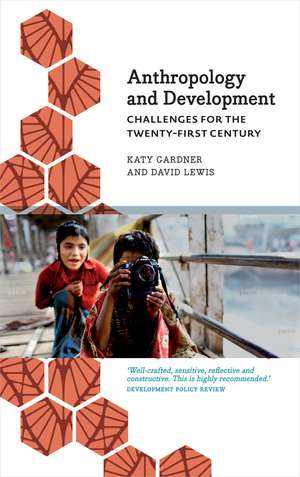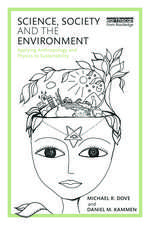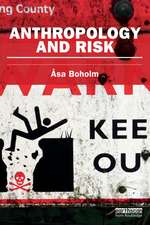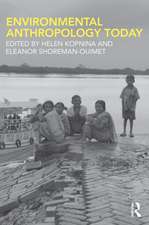Anthropology and Development: Challenges for the Twenty-First Century: Anthropology, Culture & Society
Autor Katy Gardner, David Lewisen Limba Engleză Hardback – 19 feb 2015
Western aid is in decline. New forms of aid, from within the developing countries themselves and elsewhere, are in the ascent, and a new set of global economic and political processes are shaping development in the twenty-first century. Katy Gardner and David Lewis have completely rewritten and updated their earlier, influential work, bringing it up to the present day. They engage with nearly two decades of continuity and change in the development industry, arguing in particular that while international development has expanded since the 1990s, it has become more rigidly technocratic. Anthropology & Development will serve as a reformulation of the field and as an excellent textbook for both graduate and undergraduates alike.
| Toate formatele și edițiile | Preț | Express |
|---|---|---|
| Paperback (1) | 231.91 lei 6-8 săpt. | |
| PLUTO PRESS – 19 feb 2015 | 231.91 lei 6-8 săpt. | |
| Hardback (1) | 644.44 lei 6-8 săpt. | |
| PLUTO PRESS – 19 feb 2015 | 644.44 lei 6-8 săpt. |
Din seria Anthropology, Culture & Society
-
 Preț: 131.55 lei
Preț: 131.55 lei - 8%
 Preț: 647.08 lei
Preț: 647.08 lei -
 Preț: 231.91 lei
Preț: 231.91 lei -
 Preț: 262.53 lei
Preț: 262.53 lei -
 Preț: 256.56 lei
Preț: 256.56 lei -
 Preț: 121.52 lei
Preț: 121.52 lei -
 Preț: 267.75 lei
Preț: 267.75 lei -
 Preț: 165.92 lei
Preț: 165.92 lei -
 Preț: 478.51 lei
Preț: 478.51 lei -
 Preț: 480.14 lei
Preț: 480.14 lei
Preț: 644.44 lei
Preț vechi: 700.48 lei
-8% Nou
Puncte Express: 967
Preț estimativ în valută:
123.33€ • 128.28$ • 101.82£
123.33€ • 128.28$ • 101.82£
Carte tipărită la comandă
Livrare economică 14-28 aprilie
Preluare comenzi: 021 569.72.76
Specificații
ISBN-13: 9780745333656
ISBN-10: 0745333656
Pagini: 224
Dimensiuni: 133 x 216 x 18 mm
Greutate: 0.39 kg
Ediția:Nouă
Editura: PLUTO PRESS
Colecția Pluto Press
Seria Anthropology, Culture & Society
ISBN-10: 0745333656
Pagini: 224
Dimensiuni: 133 x 216 x 18 mm
Greutate: 0.39 kg
Ediția:Nouă
Editura: PLUTO PRESS
Colecția Pluto Press
Seria Anthropology, Culture & Society
Notă biografică
Katy Gardner is Professor of Anthropology at the London School of Economics and is the author of several books including Global Migrants, Local Lives: Travel and Transformation in Rural Bangladesh (1995) and Discordant Development (Pluto, 2012). David Lewis is Professor of Social Policy and Development in the Department of Social Policy, London School of Economics. He is the author of Bangladesh: Politics, Economy and Civil Society (2012) and co-editor of The Aid Effect (Pluto, 2005).
Cuprins
Preface
Acknowledgements
Glossary
Acronyms
Prelude: Development, Post-Development and … More Development?
1: Understanding Development: Theory and Practice into the Twenty-First Century
2: Applying Anthropology
3: The Anthropology of Development
4: Anthropologists in Development: Access, Effects and Control
5: When Good Ideas Turn Bad: The Dominant Discourse Bites Back
Conclusion: Anthropology, Development and Twenty-First Century Challenges
Notes and references
Bibliography
Index
Acknowledgements
Glossary
Acronyms
Prelude: Development, Post-Development and … More Development?
1: Understanding Development: Theory and Practice into the Twenty-First Century
2: Applying Anthropology
3: The Anthropology of Development
4: Anthropologists in Development: Access, Effects and Control
5: When Good Ideas Turn Bad: The Dominant Discourse Bites Back
Conclusion: Anthropology, Development and Twenty-First Century Challenges
Notes and references
Bibliography
Index
Recenzii
“Ameliorates the despair which students of development often feel once they come to understand the complexity, and the vested interests, of the aid industry.”
"Anthropology and Developmentconcludes with a punctilious and succinct assertion of what the authors strive to maintain throughout the book: anthropology of development, like other socially engaged disciplines, has built on its past and surrounding dynamics to become self-reflexive. There is no doubt that [this book] is a staple for anyone interested in the subject."
“In our transforming, turbulent, multi-polar era, ‘development’ has definitively expanded beyond the discourses and practices of an aid industry to encompass far wider capitalist processes—as well as struggles against them. In this welcome new version of their acclaimed earlier book, Gardner and Lewis carve anthropology’s place in this brave new development world—charting and navigating change, questioning its social basis and morality, posing essential questions about who gains, who loses and why, and empowering alternatives. Essential reading for all involved with anthropology or development—and essential proof that they should engage their perspectives with each other more deeply and more often.”
“This new edition of a classical book on anthropology of development and anthropology in development combines the quality of the original with fresh and up-to-date analysis. The already impressive state of arts of the first book has been extended to most of the rapidly expanding literature of the last twenty years. This book is essential for anyone interested by debates concerning the relation between anthropology and development.”
“As the ‘post-modern challenge’ to development and social theory came and went, what happened to its insights and perhaps even its excesses? One thing is certain: Development continues to be a powerful cultural imaginary and set of practices, a space of power. By subjecting the ‘really existing worlds of development’ to an acutely perceptive anthropological lens, this carefully reworked volume by two of development’s most accomplished scholars re-invigorates, like no other treatise in the field, the connection between research, critique, and action in inspired and practical ways. Their deeply constructive approach to development results in a compelling Anthropology of Engagement that unveils the tactics of power while at the same time illuminating paths towards less unequal and more livable worlds.”
“An authoritative and up to date overview that combines accurate and insightful overviews of the major contributions in the field with their own original and illuminating arguments.”


























